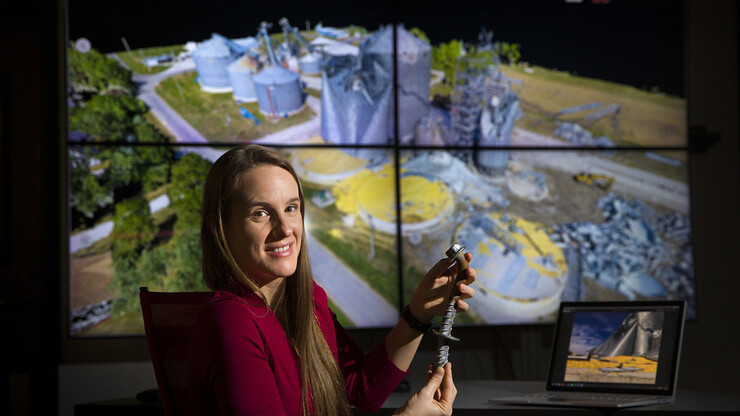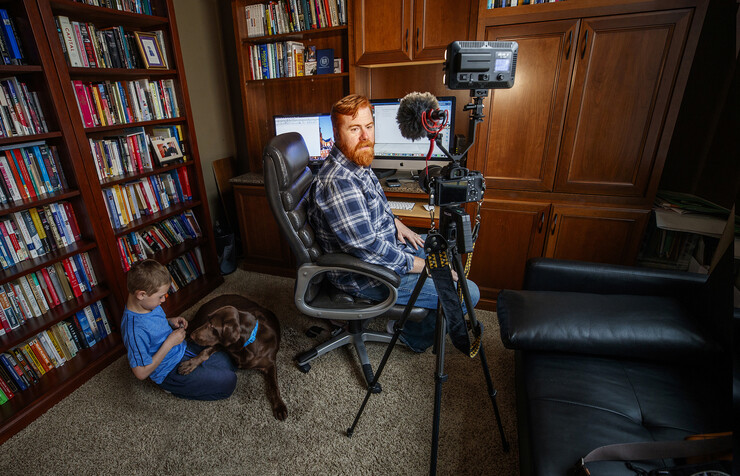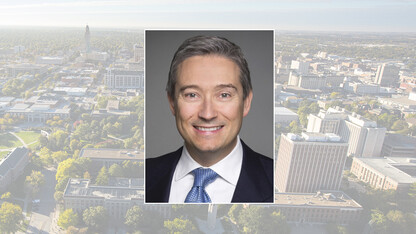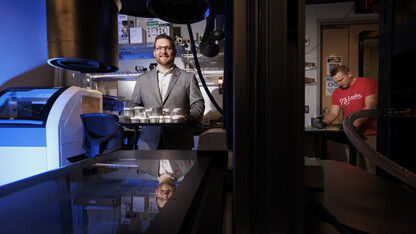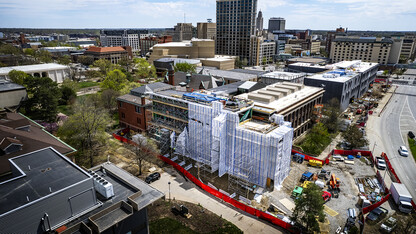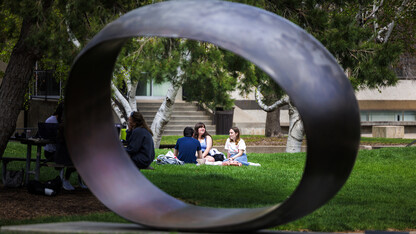· 7 min read
9/11 inspired future careers of Wittich, White

Twenty years ago, 9/11 helped direct the careers of University of Nebraska–Lincoln faculty members Christine Wittich and Tyler White.
On Sept. 11, 2001, alumnus Tyler White was a junior on campus, preparing for a career in political science with an interest in national security. Christine Wittich was in eighth grade, preparing to choose a high school in New York City. That day, their sense of freedom and safety was shaken by the attacks on the Twin Towers.
Today, Wittich, an assistant professor of civil and environmental engineering, studies building safety and has won numerous awards for her work in structural engineering. White, associate professor of practice in political science, has launched and directs the award-winning National Security Studies program at Nebraska.
On 9/11, Wittich was 12 years old and attending middle school in Staten Island, New York City. About to enter high school, Wittich and her peers were looking forward to choosing from high schools across the city and welcoming the freedom that would come with their student MetroCards.
Their excitement and anticipation was shaken when terrorists attacked their city.
“It was a harsh reality. All of a sudden you realize you’re not in this perfectly safe bubble,” she said. “It definitely made you feel like you needed to grow up a little bit faster. We realized that the rest of the world is a reality that we need to consider.”
The attack’s repercussions caused Wittich to re-consider her high school options, as well as her sense of safety.
“Seeing the struggle that it took so many people just to get back to their families, that really put things in perspective,” Wittich said. “I asked myself, ‘Do you really want to travel that far to go to high school or might it be better to kind of stay a little bit closer?’”
A crucial aspect of Wittich’s career in structural engineering, the idea of safety still sticks with her 20 years later.
“It’s pervasive. That’s the main goal of everything that we do as structural engineers is safety for everyone,” she said.
Wittich has researched building safety amidst natural hazards for the majority of her career. Her studies of the implosion of Cather-Pound Hall at the University of Nebraska-Lincoln have informed structural engineers on various aspects of collapse. Notably, she found that in an event such as an earthquake, the collapse of one building increases the risk of collapse for surrounding buildings.
Currently, Wittich is focusing her research on rural community resiliency from natural hazards such as severe wind storms to protect the agricultural economy.
Wittich recalls choosing to study structural engineering in high school. She saw a way to merge her success in STEM courses with her desire to keep communities safe.
“I knew that I wanted to do something impactful and that could help people and I think that some of that does stem from growing up in New York,” she said.
White was already studying national security when 9/11 occurred. A junior political science major, 9/11 changed his field of national security studies and led to the creation of the national security studies program. Now, he uses lessons learned from 9/11, Iraq and Afghanistan to prepare his students for careers in national security.
“9/11 was a national trauma but it also brought out a lot of really good things in people,” White said. “A lot of people signed up for the military and did amazing things for the country. For me, it sort of created this path forward where I realized that national security was something that I could also participate in.”
On 9/11, White was preparing to go to class, a seemingly normal day for any college student.
“I remember waking up in Pound Hall and on the radio they said that somebody had flown an airplane into the World Trade Center,” White said. “By the time I got downstairs the first tower had fallen. I remember going straight to class and the professor I had at the time was from New York. It was clear that there was a sense of trauma going on, not just with students but with everybody.”
That day, national security interests shifted.
“If you were into political science or the national security trade, it felt like everything changed overnight,” White said. “All of a sudden we focused in on this new thing, and it was like drinking from a firehose trying to learn everything you possibly could about what was going on.”
In retrospect, White thinks the response to 9/11 could have been different, but uses that information to better educate his students.
“What you wanted after 9/11 was clear action,” he said. “But I think we could go back and make some different decisions and better decisions about what we were going to do.”
One of those decisions was the decision to invade Iraq in 2003. Since then, White has observed conversations within the intelligence community around the analysis that led to the Iraq War. White’s peers believe better analysis would have resulted in better outcomes.
“That knowledge has informed the way I teach so much,” White said. “I want students to be able to do better and objective analysis because the way you think the world works and the way the world actually works are oftentimes two different things. I got to see that discussion happen a little bit from a civilian side inside the CIA. Getting a chance to interact with those people has led to these career-long priorities for me, and all that comes out of 911 and the Iraq War.”
White’s priorities include educating not only future national security employees, but the general public.
“Every single human being living in the world today should have a better set of analytic tools. I want students to leave the University of Nebraska and be like hey I can sit down and actually think for myself, critically think for myself when I can take in information,” he said.
With time, White has seen his students’ perspectives shift as years passed. White went from teaching students who justified the War on Terror with the emotional trauma left by 9/11. Now, he teaches students who don’t remember 9/11.
“You talk with students who don’t have a living memory of or maybe weren’t even born on 9/11, and they take a very different approach to it, because the way they understand the facts, that’s all come to them secondhand,” he said.
These students may not know an America that’s not at war in Afghanistan. After pulling out of Afghanistan, students can learn from analyses on the war and continue preparing for new and ongoing security threats.
Looking forward, White says America’s biggest threats and challenges will be domestic politics and domestic terrorism, as well as re-focusing on their position as a global power.
White will continue to provide high-quality education in what he called “One of the best jobs in the world” while remembering 9/11.
“9/11 changed a lot of things, but maybe one of the things that it did was it opened up this space on our campus where we could send students out into the national security business and make a difference,” White said.
